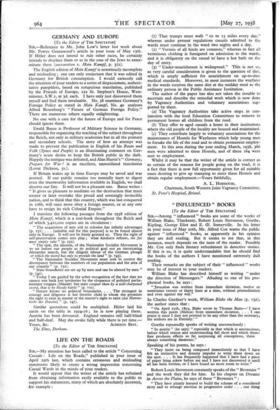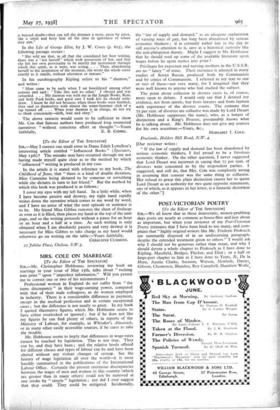" INFLUENCED " BOOKS
[To the Editor of THE SPECTATOR]
SIR,—Among " influenced " books are some of the works of William Blake, Thackeray, Robert Louis Stevenson, Goethe, Kipling, George Eliot and E. CE. Somerville. In his letter
in your issue of May 20th, Mr. Alfred Cox warns the public against " influenced " books, as apparently in his opinion they are dull reading. But it seems to me that, in this instance, much depends on the taste of the reader. Possibly Mr. Cox only finds literary refreshment in detective stories.
If this is so, it is quite understandable that he should find the books of the authors I have mentioned extremely dull reading.
Their remarks on the subject of their " influenced " works may be of interest to your readers.
William Blake has described himself as writing "under the direction of Messengers." Alluding to one of his pro- phetical books, he says :
"Jerusalem was written from immediate dictation, twelve or sometimes twenty or thirty lines at a time, without premeditation and even against my will.'
In Charles Gardner's work, William Blake the Man (p. 132),
the author states that :
"On April 25th, 1803, Blake wrote to Thomas Butts—` I have written this poem (Milton) from immediate dictation. . . I can praise it since I dare not pretend to be any other than the secretary, the authors are in Eternity.'"
Goethe repeatedly speaks of writing unconsciously :
"In poetry" (he says) "especially in that which is unconscious, before which reason and understanding fall short and which there- fore produces effects so far surpassing all conceptions, there always something daemonic."
Speaking of his poems, he says :
"They insist on being composed immediately so that I have felt an instinctive and dreamy impulse to write them down on the spot. . . . It has frequently happened that I have had a piece of paper lying askew before me and I have not discovered it until all has been written, or I have found no more room to write."
Robert Louis Stevenson constantly speaks of the" Brownies" and the work they did for him. In his chapter on Dreams
in Across the Plains, he says of these " Brownies " :
"They have plainly learned to build the scheme of a considered story and to arrange emotion in progressive order . . . one thing As beyond doubt—they can tell the dreamer a story, piece by piece, like a serial and keep him all the time in ignorance of where they aim."
In the Life of George Eliot, by J. W. Cross (p. 623), the following passage occurs : "She told me that, in all that she considered her best writing, There was a 'not herself' which took possession of her, and that she felt her own personality to be merely the instrument through which this spirit, as it were, was acting. . . . Then, abandoning herself to the inspiration of the moment, she wrote the whole scene exactly as it stands, without alteration or erasure."
In his autobiography Kipling refers to his "daemon," and writes : "Mine came to be early when I sat bewildered among other notions and said : 'Take this and no other.' I obeyed and was rewarded. . . . My daemon was with me in the Jungle Books, Kim, and both Puck books, and good care I took lest he should with- draw. I know he did not because, when those books were finished, they said so themselves with almost the water-hammer click of a tap turned off. . . . When your daemon is in charge, do not try to think consciously—drift, wait and obey."
• The above extracts would seem to be sufficient to show Mr. Cox that famous authors have produced long connected narratives "without conscious effort or thought."—Yours



















































 Previous page
Previous page